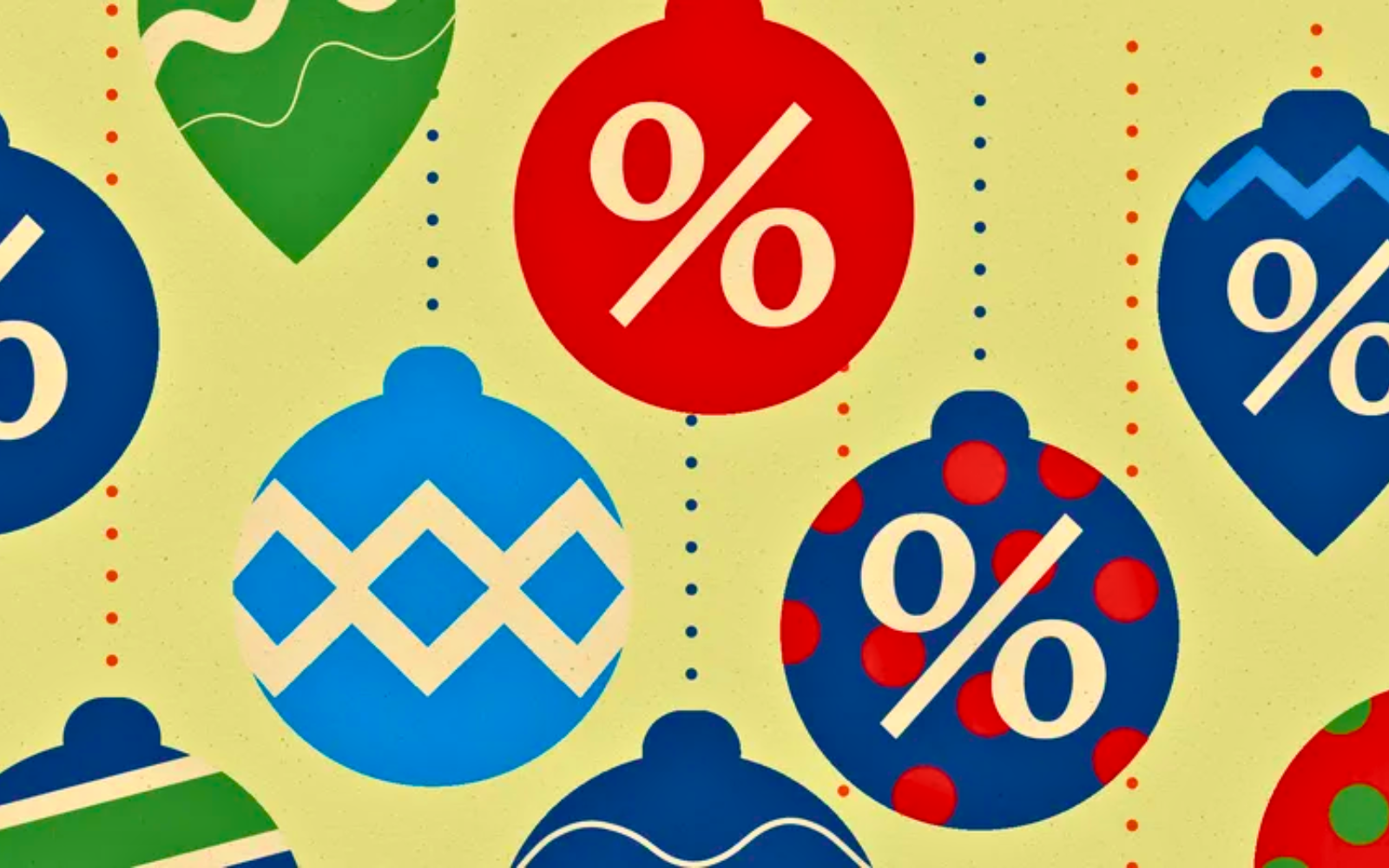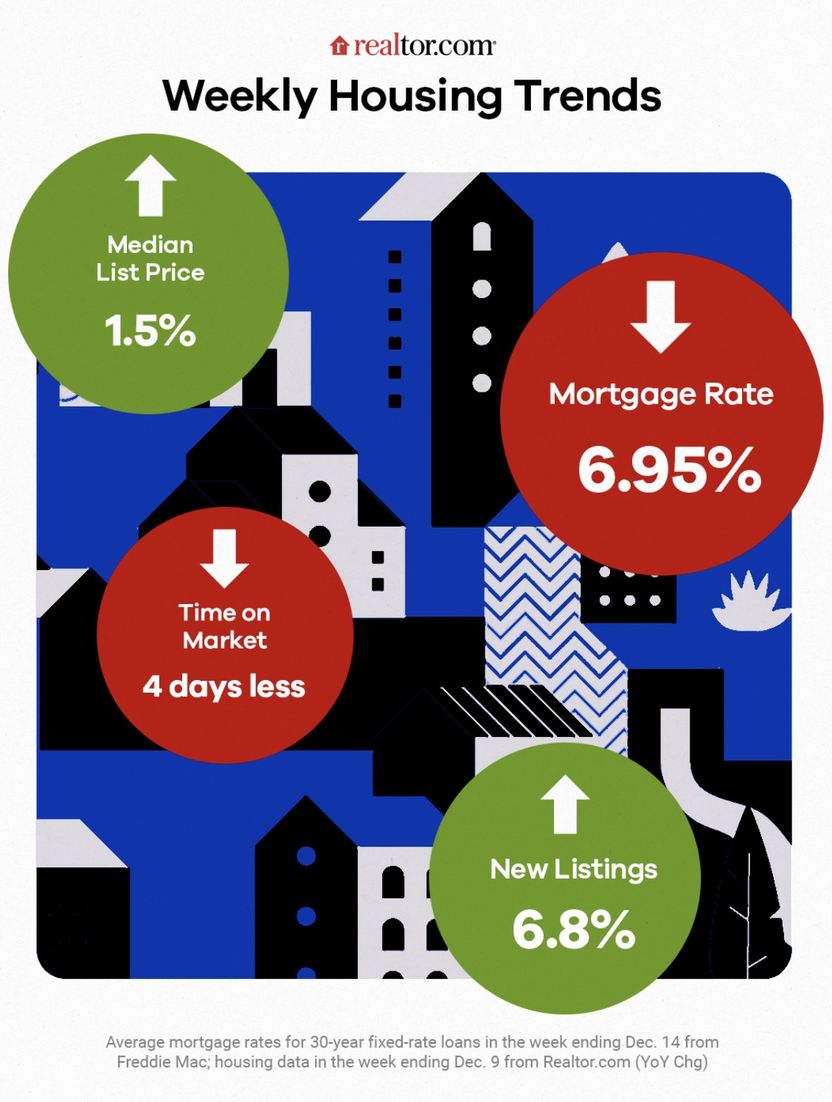Mortgage Rates Just Dipped Below 7%—and May Go Even Lower. Here’s Why.
By Margaret Heidenry | REALTOR.COM
Homebuyers have a lot to be joyful for right now as mortgage rates have dipped below 7%—the first time they’ve done so since August.
For the week ending Dec. 14, rates for a 30-year fixed-rate home loan averaged 6.95%, according to Freddie Mac.
And odds are, mortgage rates will continue their long-awaited downward trend, providing some much-needed relief on the affordability front to homebuyers.
“Given inflation continues to decelerate and the Federal Reserve Board’s current expectations that they will lower the target rate next year, we likely will see a gradual thawing of the housing market in the new year,” says Sam Khater, Freddie Mac’s chief economist.
In addition to lower mortgage rates, another welcome gift for buyers arrived this week in the form of new listings. Will 2024 turn out to be the year hesitant buyers (and sellers) make resolutions to get into the real estate game?
We’ll explain what the housing statistics portend for buyers and sellers in the latest installment of “How’s the Housing Market This Week?”
The economic good cheer
A lot of favorable economic news hit headlines in the past week: On Monday, the jobs report showed 199,000 new jobs were added to the economy in November. Tuesday saw the release of inflation data, with the annual rate of inflation dropping to 3.1% in November, down from 3.2% in October.
Then on Wednesday, the Federal Reserve “assessed these data points and voted to hold the short-term policy rate steady,” explains Realtor.com® data scientist Sabrina Speianu in her most recent analysis. (Mortgage rates aren’t directly tied to the rate the Fed sets, but the two numbers usually move in tandem.)
Stubborn home prices could fall
What would help make the welcome news of falling mortgage rates that much better? Falling home prices.
For the week ending Dec. 9, home prices edged 1.5% higher than this same week a year earlier—the highest growth rate seen since May.
Yet homebuyers who stand firm in their resolve to buy a house have seasonal price trends on their side. In June, prices peaked at $441,000, and have since fallen to $420,000 in November.
“The nation’s median listing price has been declining seasonally and is 6.8% below this year’s peak,” points out Speianu. “With seasonality so far this autumn tracking similarly to last year, the median list price may decrease another 2% by end of the year.”
And these lower prices might dip even further in January and beyond, with Speianu saying she expects “seasonally low listing prices in the coming months.”
Why the mortgage lock-in effect is loosening
The mortgage “lock-in” effect—which held many homeowners financially beholden to their existing low mortgage rate since rates began to soar—might be easing.
Sellers, perhaps lured to the market by friendlier rates, are putting up “For Sale” signs again, with new listings up 6.8% for the week ending Dec. 9 compared with the same week last year.
“After an extended period of less listing activity from sellers due to the mortgage rate lock-in effect, newly listed homes have risen above last year’s levels for the seventh week in a row,” explains Speianu.
Overall active inventory (a combination of new and old homes for sale) also increased for the week ending Dec. 9, with for-sale homes 4% above year-ago levels.
While a rise in active listings for the fifth week in a row is something to celebrate, inventory is declining seasonally.
Homebuyers can expect the usual winter dearth of inventory to continue “for the remainder of the season until March,” says Speianu. “That said, with the expectation that rates will lower over the next year, home listing activity should experience a gradual recovery next spring.”
Why homebuyers have to act fast
Homebuyers who are out there real estate shopping right now are wasting no time closing deals when they can: For the week ending Dec. 9, homes spent four fewer days on the market compared with last year. (Homes spent 52 days on the market in November on average.)
“For the 10th week in a row, the typical home spent less time on the market than the same week in the prior year,” says Speianu.




